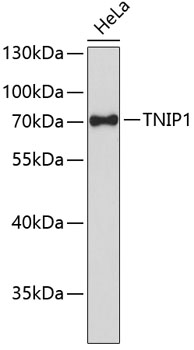-
Product Name
TNIP1 Polyclonal Antibody
- Documents
-
Description
Polyclonal antibody to TNIP1
-
Tested applications
WB
-
Species reactivity
Human
-
Alternative names
TNIP1 antibody; ABIN-1 antibody; NAF1 antibody; VAN antibody; nip40-1 antibody; TNFAIP3-interacting protein 1 antibody
-
Isotype
Rabbit IgG
-
Preparation
Antigen: A synthetic peptide of human TNIP1
-
Clonality
Polyclonal
-
Formulation
PBS with 0.02% sodium azide, pH7.3.
-
Storage instructions
Store at 4℃. Avoid freeze / thaw cycles.
-
Applications
WB 1:500 - 1:2000
-
Validations

Western blot - TNIP1 Polyclonal Antibody
Western blot analysis of extracts of HeLa cells, using TNIP1 antibody .Secondary antibody: HRP Goat Anti-Rabbit IgG (H+L) at 1:10000 dilution.Lysates/proteins: 25ug per lane.Blocking buffer: 3% nonfat dry milk in TBST.
-
Background
Inhibits NF-kappa-B activation and TNF-induced NF-kappa-B-dependent gene expression by regulating A20/TNFAIP3-mediated deubiquitination of IKBKG; proposed to link A20/TNFAIP3 to ubiquitinated IKBKG. Involved in regulation of EGF-induced ERK1/ERK2 signaling pathway; blocks MAPK3/MAPK1 nuclear translocation and MAPK1-dependent transcription. Increases cell surface CD4(T4) antigen expression. Involved in the anti-inflammatory response of macrophages and positively regulates TLR-induced activation of CEBPB. Involved in the prevention of autoimmunity; this function implicates binding to polyubiquitin. Involved in leukocyte integrin activation during inflammation; this function is mediated by association with SELPLG and dependent on phosphorylation by SRC-family kinases. Interacts with HIV-1 matrix protein and is packaged into virions and overexpression can inhibit viral replication. May regulate matrix nuclear localization, both nuclear import of PIC (Preintegration complex) and export of GAG polyprotein and viral genomic RNA during virion production. In case of infection, promotes association of IKBKG with Shigella flexneri E3 ubiquitin-protein ligase ipah9.8 p which in turn promotes polyubiquitination of IKBKG leading to its proteasome-dependent degradation and thus is perturbing NF-kappa-B activation during bacterial infection.
Related Products / Services
Please note: All products are "FOR RESEARCH USE ONLY AND ARE NOT INTENDED FOR DIAGNOSTIC OR THERAPEUTIC USE"
